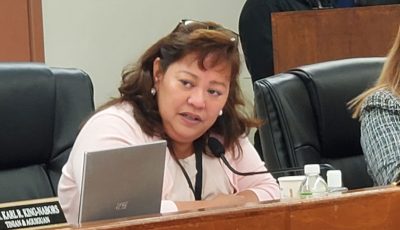NMBAC: USCIS to make process easy
The Northern Marianas Business Alliance Corp. said U.S. Citizenship and Immigration Services assured them that they would make a smooth transition of the provisions stated on the NMI Workforce Act.
The legislation, introduced as H.R. 5956, became law after being signed by President Donald J. Trump last Tuesday (Wednesday in the CNMI). It increased the CNMI-Only Transitional Worker program’s cap from 4,999 for fiscal year 2019 to 13,000 and extended it until 2029 were among the law’s provisions.
“On behalf of the NMBAC and its members, we are extremely happy with the news that President Trump signed H.R. 5956 into law [Tuesday],” said NMBAC in a statement.
NMBAC, led by chair Alex Sablan, added they also had conference call with USCIS and Department of Homeland Security officials early Thursday morning at the Governor’s Office that was attended by administration officials and NMBAC staff.
“We are also happy to report that in a conference call early [Thursday] morning between the Governor’s Office, NMBAC staff, and officials from USCIS and DHS headquarters, we were informed that the application window for FY 2019 has been reopened immediately,” said NMBAC in a statement.
“USCIS pledged to make this process as seamless as possible while allowing for the new rules to be formulated, they will begin accepting renewals and new applications for FY19 immediately.”
USCIS, after FY 2019’s 4,999 cap of CW-1 petitions was met last April 11, will now resume receiving applications. Employers can now reapply the petitions for their workers that were previously rejected.
The NMBAC said the odds were stacked against the CNMI team, but they did not give up and continued to push for the passage of the legislation.
“While some questioned whether this bill could be passed before the expiration of the CW program in 2019, the business community remained steadfast in its commitment to secure passage as quickly as possible,” added NMBAC in the statement.
“The partnership with Gov. [Ralph DLG] Torres and the Washington, [D.C.] CNMI team did not give up despite the odds facing them and that showed with the final signature needed for it to become law [Tuesday].”
What’s new?
The NMI Workforce Act also extends the exemption of the following Consolidated Natural Resources Act of 2008 provisions until Dec. 31, 2029: the national cap for H-1B and H-2B workers in the CNMI and Guam, the bar on asylum application in the Commonwealth, and the CNMI-Only Nonimmigrant Investor (E-2C) program.
USCIS will collect a $50 fraud prevention and detection fee for each CW-1 petition submitted by an employer aside from the current fees. The fraud and prevention fee, however, does not apply to those CW-1 petitions that were already filed as of July 24, 2018 and are pending for action.
Employers will also be required by the Workforce Act to enroll in the web-based system E-Verify and must follow the requirements of the program. The E-Verify would compare the information from Form I-9 Employment Eligibility Verification to federal records to confirm if the petitioned employee is eligible to work in the U.S.
USCIS said E-Verify enrolment would soon be a requirement for all employers that would file for CW-1 visas. “USCIS strongly encourages CNMI employers to enroll in the E-Verify program as soon as possible.”
The Workforce Act has also set a new cap from FY 2019 to 2029 with the numerical limit set at 500 from FY 2020 to 2023 and 1,000 from FY 2024 to 2029 while there would only be 1,000 slots for the first quarter of FY 2030.
DHS would also exercise its discretion, as stated in the Workforce Act, in delaying the implementation of other changes to the CW-1 program that would affect employers filing the petitions until they issue a final rule.
USCIS, as of July 24 this year, will only accept the May 9 version of the I-129CW petition for CNMI-Only Nonimmigrant Transitional Worker forms. They said that they would reject and return the fees paid of any petition submitted that used a Dec. 11, 2017 date or an earlier version of the Form I-129CW.



























